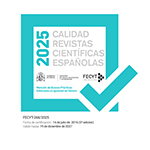From the Granada School to the Clan Mudéjar: Academic survival and intellectual turn of Fernando de los Ríos’ disciples during the First Francoism (1936-1953)
Abstract
Since the beginning of Spanish Civil War, rebels undertake the depuration of numerous republican or innovative intellectuals, interrupting the Silver Age of Spanish culture. Nevertheless, Francoist dictatorship cannot eradicate the previous intellectual tradition. It survived in most of reprisal intellectuals’ disciples, hidden under their adherence to Francoist State. The article analyses the relationship between intellectuals and the dictatorship, from the trajectories of Enrique Gómez Arboleya and Nicolás Ramiro Rico, Fernando de los Ríos’ disciples. They take helpful positions to the dictatorship, involved in academic nets created in the War or the Post-war, contributed to build the Francoist legal culture and unlink to their master, though kept a part of De los Ríos’ intellectual and scientific heritage and his sociological vocation and distanced from the dictatorship in 1950s. The study is based on the analysis of their works and access exams as professors of Legal Philosophy, Political Law and Sociology since 1940 to 1953.
Downloads
Article download
License
Aquellos autores/as que tengan publicaciones con esta revista, aceptan los términos siguientes:
a. Los autores/as conservarán sus derechos de autor y garantizarán a la revista el derecho de primera publicación de su obra, el cuál estará simultáneamente sujeto a la Licencia de reconocimiento de Creative Commons Reconocimiento-No comercial-Sin obra derivada 4.0 España que permite a terceros compartir la obra siempre que se indique su autor y su primera publicación esta revista.
b. Los autores/as podrán adoptar otros acuerdos de licencia no exclusiva de distribución de la versión de la obra publicada (p. ej.: depositarla en un archivo telemático institucional o publicarla en un volumen monográfico) siempre que se indique la publicación inicial en esta revista.
Plagio y fraude científico
La publicación de un trabajo que atente contra los derechos de propiedad intelectual será responsabilidad de los autores/as, que serán los que asuman los conflictos que pudieran tener lugar por razones de derechos de autor. Los conflictos más importantes pueden darse por la comisión de plagios y fraudes científicos.
Se entiende por plagio:
1.Presentar el trabajo ajeno como propio.
2.Adoptar palabras o ideas de otros autores sin el debido reconocimiento.
3.No emplear las comillas u otro formato distintivo en una cita literal.
4.Dar información incorrecta sobre la verdadera fuente de una cita.
5.El parafraseo de una fuente sin mencionar la fuente.
6.El parafraseo abusivo, incluso si se menciona la fuente.
Las prácticas constitutivas de fraude científico son las siguientes:
1.Fabricación, falsificación u omisión de datos y plagio.
2.Publicación duplicada.
3.Conflictos de autoría.












